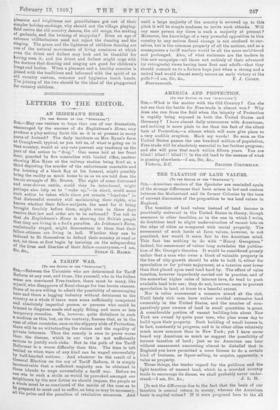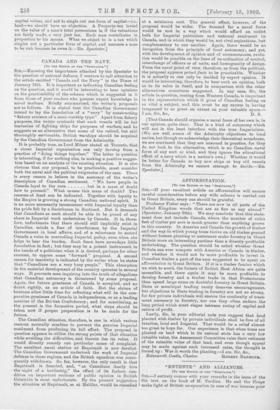THE TAXATION OF LAND VALUES.
[To nue EDITOR Or THE " SPROTATOIL"j
SIR,—American readers of the Spectator are reminded again of the strange differences that have arisen in law and custom between the Motherland and its former Colonies by the tone of current discussion of the proposition to tax land values iu England.
The taxation of land values instead of land income is practically universal in the United States in theory, though assessors in other localities, as in the one in which I write, do doubtless tend to slight undervaluation of vacant lots on the edge of cities as compared with rental property. The assessment of such lands at farm values, however, is not practised, nor would it seem fair to the American mind. This fact has nothing to do with " Henry Georgeism." Indeed, the assessment of values long antedates the publica- tion of Mr. George's theories. It would be considered grossly unfair that a man who owns a block of valuable property in the line of city-growth should be able to hold it, either for speculation or for private enjoyment, at a taxation cost lower than that placed upon used land hard by. The effect of value taxation, however imperfectly carried out in practice, and of the somewhat higher rates of interest here, do tend to push available land into use; they do not, however, seem to prevent speculation in land, at times to a baneful extent.
Nor is value assessment a measure aimed at the rich. Until lately rich men have rather avoided extensive land ownership in the United States, and the number of com- paratively poor owners of land in small quantities is great. A considerable portion of vacant building-lots about New York are owned by quite poor men, who plan some day to build upon their property. Such building of small houses is, in fact, constantly in progress, and is in other cities relatively much more common than in New York ; yet I have never heard any American so much as suggest the possibility of income taxation of land ; just as no American can hear without amazement amounting almost to disbelief that in England you have permitted a mere license to do a certain kind of business, as liquor selling, to acquire, apparently, a value as property. These things, the tender regard for the publican and the light taxation of unused land, which in a crowded country tends to encourage its disuse, we shall probably never under• [Is not the difference due to the fact that the basis of our taxation is annual return in money, whereas the American basis is capital values P If it were proposed hero to tax all
capital values, and not to single out one form of capital—i.e., land—we should have no objection. A Property-tax levied on the value of a man's total possessions is, if the valuations are fairly made, a very just tax. Each man contributes in proportion to his means. What we object to is a tar which singles out a particular form of capital, and assumes a man to be rich because he owns it.—En. Spectator.]










































 Previous page
Previous page